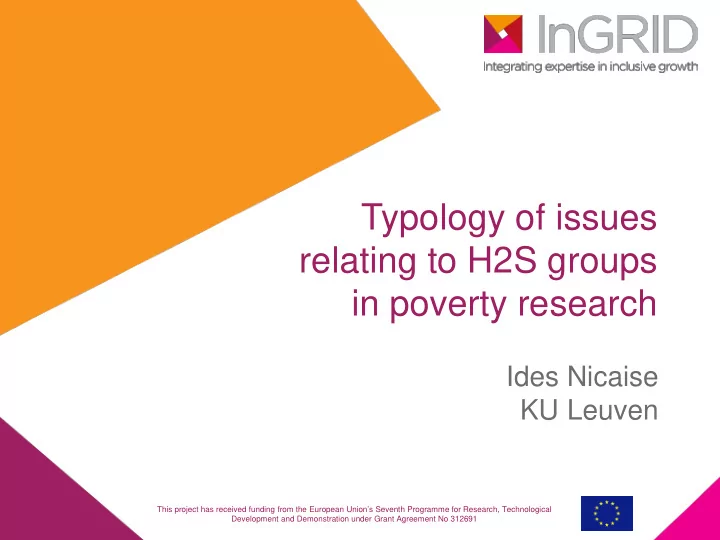

Typology of issues relating to H2S groups in poverty research Ides Nicaise KU Leuven This project has received funding from the European Union’s Seventh Programme for Research, Technological Development and Demonstration under Grant Agreement No 312691
What are hard-to-survey (H2S) groups? Tourangeau (2014) • Hard-to-sample: e.g. homeless people (unknown populations, small numbers…) • Hard-to-identify: e.g. Roma, migrants (variety of definitions, fluctuating states…) • Hard-to-contact: e.g. migrants, displaced groups (language / cultural barriers…) • Hard-to-persuade: e.g. undocumented immigrants (hidden groups, stigma…) • Hard-to-interview: e.g. low-literate people, children, people with mental illness / disorders (complexity of surveys, complexity of living conditions… ) www.inclusivegrowth.be www.inclusivegrowth.be Title/date 2
Hard-to-sample • Causes – Rare (<10%, <1%): e.g. homeless – Hidden (e.g. undocumented migrants) • Problems – Absence of sampling frame – High cost of screening • Solutions – Non-random sampling (indirect sampling, RDS…) – Stratification (with oversampling of high-prevalence strata) – Dual frame approach (one general-purpose sample with high coverage of overall population but low prevalence of the rare group, and one with low coverage & high prevalence) www.inclusivegrowth.be www.inclusivegrowth.be Title/date 3
Hard-to-identify • Causes: – Vague / variable definitions; invisible characteristics (e.g. poor, Roma) – Hidden populations (e.g. undocumented immigrants) • Problems: – High cost of screening + imperfect screening – False negative cases => undercoverage – Motivated misreporting • Solutions: – Use of conventional / official definitions – Full-roster categorisation – Network-based sampling: snowball, RDS www.inclusivegrowth.be www.inclusivegrowth.be Title/date 4
Hard-to-reach • Causes: – Elusive populations (e.g. travellers, homeless, refugees) • Problems: – Undercoverage (short-term members escape) – Stock sampling bias – Tracking costs / attrition (in panel surveys) • Solutions: – Location sampling – Flow sampling (at inflow) – Panels: anticipate mobility; remunerate respondents www.inclusivegrowth.be www.inclusivegrowth.be Title/date 5
Hard-to-persuade • Causes: – Hostility towards public services, bureaucracy (e.g. people excluded from benefits, sanctioned / traumatised groups) • Problems: – Refusal rates – Response bias • Solutions: – Sensitisation (of gatekeepers as well as respondents) – Participatory (community-based) research – Feedback about research findings and impact – (Financial) incentives www.inclusivegrowth.be www.inclusivegrowth.be Title/date 6
Hard-to-interview • Causes: – Language barriers (e.g. migrants) – Vulnerability (e.g. children, disabled people) – Low literacy / cognitive or communication impairments / mental illness / distress • Problems: – Interrupted interviews – Item non-response – Unreliable answers • Solutions: – Proxies / mediators – Simplified questionnaires – audio computer-assisted self interviews (ACASI) www.inclusivegrowth.be www.inclusivegrowth.be Title/date 7
To conclude Challenges: – Under-representation in general-population surveys – Bias in response, even more in specific surveys – Cost of survey ⇒ Need for innovative survey methodologies Groups often combine several challenges Indicators – Metadata: % contact failure / attrition, % refusals, % interrupted interviews, item non-response – Cost indicators: screening cost, average unit cost per effective interview… www.inclusivegrowth.be www.inclusivegrowth.be Title/date 8
Issues to be addressed in this course • (Definitions: e.g. typology of homelessness, Roma…) • Sampling techniques: e.g. dual sampling frames, indirect sampling, capture-recapture, respondent-driven sampling etc. • Questionnaire design • Data collection procedures: e.g. mobilising populations, tracking, mediation, participative methods, ethical issues • Anthropological issues: e.g. how to contact hidden populations, how to overcome cultural barriers • Statistical analysis: estimating population size of undercounts, selection bias, imputation, attrition etc. www.inclusivegrowth.be www.inclusivegrowth.be Title/date 9
• TOURANGEAU R. EDWARDS B., JOHNSON T., WOLTER K., BATES N. (eds., 2014), Hard-to-survey populations , Cambridge University Press, Chapter 1 • SCHEPERS W., JUCHTMANS G., NICAISE I. (2016), Reaching out to hard-to-survey groups among the poor. Survey protocols, statistical issues and research design , Leuven: HIVA, Chapter 1 www.inclusivegrowth.be www.inclusivegrowth.be Title/date 10
Co-ordinator Guy Van Gyes Monique Ramioul InGRID Inclusive Growth Research Infrastructure Diffusion Partners Contract No 312691 TÁRKI Social Research Institute Inc. (HU) For further information about the InGRID project, please contact Amsterdam Institute for Advanced labour Studies, Universiteit van Amsterdam (NL) inclusive.growth@kuleuven.be The Swedish Institute for Social Research, Stockholms Universitet (SE) www.inclusivegrowth.be Fachbereich IV, Wirtschafts- und Sozialstatistik, Universität Trier (DE) p/a HIVA – Research Institute Centre d’Etudis Demogràfics, Campus de la Universitat Autònoma de Barcelona (ES) for Work and Society Centre d’Etudes de Population, de Pauvreté et de Politiques Socio-Economiques (LU) Parkstraat 47 box 5300 Centre for Social Policy, Universiteit Antwerpen (BE) 3000 Leuven Institute for Social & Economic Research, University of Essex (UK) Belgium Bremen International Graduate School of Social Sciences, Universität Bremen (DE) Department of Dynamics of Organisations of Work, Centre d’Etudes de l’Emploi (FR) The Centre for European Policy Studies (BE) Dipartimento di Economica e Menagement, Università di Pisa (IT) Social Statistics Division, University of Southampton (UK) Luxembourg Income Study, asbl (LU) WageIndicator Foundation (NL) School of Social Sciences, The University of Manchester (UK)
Recommend
More recommend